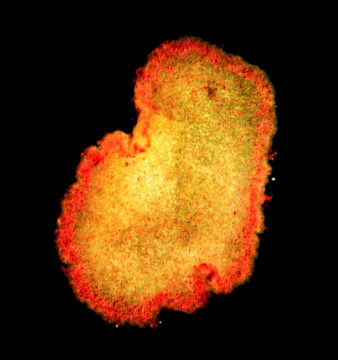Elizabeth Pennisi in Science:

Dive among the kelp forests of the Southern California coast and you may spot orange puffball sponges (Tethya californiana)—creatures that look like the miniature pumpkins used for pies. No researchers paid them much mind until 2017, when William Joiner, a neuroscientist at the University of California (UC), San Diego, decided to look into whether sponges take naps.
That’s not as silly a question as it seems. Over the past few years, studies in worms, jellyfish, and hydra have challenged the long-standing idea that sleep is unique to creatures with brains. Now, “The real frontier is finding an animal that sleeps that doesn’t have neurons at all,” says David Raizen, a neurologist at the University of Pennsylvania (UPenn) Perelman School of Medicine. Sponges, some of the earliest animals to appear on Earth, fit that description. To catch one snoozing could upend researchers’ definition of sleep and their understanding of its purpose.
More here.
